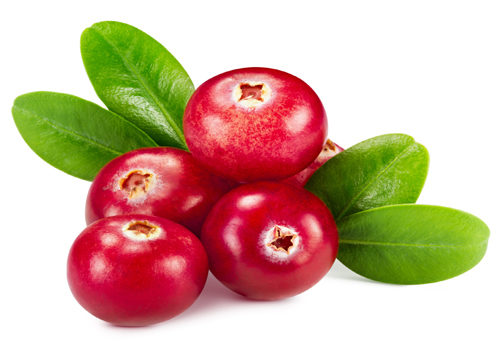
Ever been told to drink cranberry juice to ward off a urinary tract infection (UTI)? It turns out this classic home remedy may have some medical merit. In recent years, studies suggest that cranberries can support urinary health in some people.
How Might Cranberries Work?
UTIs are believed to be the cause of about eight million medical appointments annually, racking up over $1.6 billion in expenses (1). Considering the substantial amount of time and money put into healing these infections, the focus has shifted from merely treating UTIs to figuring out how to stop them from developing in those most at risk (1).
It was once thought that cranberries stopped UTI-causing bacteria like E. coli by creating an acidic urinary environment hostile to these bacteria (2). However, in recent years, researchers have found cranberries actually make it tough for bacteria to stick to the walls of the urinary tract (2). Researchers found that this process results in the body being able to potentially flush out bacteria and keep them from sticking together in biofilms, where they multiply and create an infection-friendly situation in the urinary system (3).
Juice or Pill?
So, what is the difference between drinking cranberry juice and taking cranberry extract in the form of a supplement?
Some studies show that drinking the juice is more effective than supplemental intake of the cranberry  extract for stopping E. coli biofilms from forming (4). Other studies indicate that due to the higher concentration of cranberry in its extract form, it is more likely to offer health benefits than the juice. Taking the extract is also a great option for people with taste aversions to cranberries, as well as those trying to avoid the sugar or any of the potential stomach discomfort associated with drinking cranberry juice.
extract for stopping E. coli biofilms from forming (4). Other studies indicate that due to the higher concentration of cranberry in its extract form, it is more likely to offer health benefits than the juice. Taking the extract is also a great option for people with taste aversions to cranberries, as well as those trying to avoid the sugar or any of the potential stomach discomfort associated with drinking cranberry juice.
When figuring out which option is most beneficial to you, talk to a healthcare provider first.
Who Should Try It?
Even though urinary health is vital in the maintenance of every person’s overall health, women with a history of UTIs and related urinary problems may be the best candidates for taking a cranberry extract. A 2012 study headed by UTI researcher Deborah Wing, M.D., found that women with a history of UTIs were 47% less likely to develop an infection while regularly consuming cranberry products (5). Despite these findings, it is important to note that cranberries cannot be considered a cure or guranteed prevention against UTIs.
There is no exact dosage recommended for preventing UTIs, but experts have suggested 8–10 oz. of juice daily as a possible guideline. Various supplement forms will have dosing recommendations on the package. Discussing your dosage options with your doctor is the best way to figure out what works best for you.
If you are concerned about kidney stones, be cautious when consuming cranberry juice. Research shows that an excess of oxalate caused by drinking too much cranberry juice may be linked to the development of kidney stones in combination with calcium (6). Some cranberry extracts do not contain oxalates, and therefore may be helpful to those worried about stones.
Though research has shown the promising benefits of cranberries for urinary health, it has not been proven that cranberry consumption is guaranteed to eliminate UTIs altogether. So, speak to a doctor about whether incorporating some form of cranberries into your diet may be right for you.
Support Beyond Cranberries
In the fight against developing UTIs, there are ways to be proactive beyond the use of cranberries. Probiotics are thought to be another possible option for women who experience reoccurring infections. In a double-blind study done by Ann Stapleton, M.D., women who had a history of UTIs were 50% less likely to develop another infection after using the vaginal probiotic lactobacilli (7). This good bacteria was missing from patients right before and during a UTI, which suggests that replenishing the body’s supply of vaginal lactobacilli could hold preventive properties against fighting the bad bacteria that cause UTIs, particularly gut-sourced E. coli (7).
Also make sure you consume enough water on a daily basis (8). About six to eight 8-oz. glasses of water a day is recommended, but some experts advocate for more depending on your personal biology, environment and activity level. Herbs like dandelion, in oral combination with uva ursi, are also great to include as a supplement, tea or green leafy addition to salads and other dishes. (9) WF
References
1. “New Evidence On How Cranberry Juice Fights Bacteria That Cause Urinary Tract Infections,” www.sciencedaily.com/releases/2010/08/100823183807.htm, accessed June 2, 2015.
2. “Cranberries for UTI Prevention,” www.webmd.com/urinary-incontinence-oab/womens-guide/cranberries-for-uti-protection, accessed June 2, 2015.
3. “New Evidence On How Cranberry Juice Fights Bacteria That Cause Urinary Tract Infections,” www.acs.org/content/acs/en/pressroom/newsreleases/2010/august/new-evidence-on-how-cranberry-juice-fights-bacteria-that-cause-urinary-tract-infections.html, accessed June 2, 2015.
4. “More Power to the Cranberry: Study Shows the Juice is Better than Extracts at Fighting Bacterial Infections,” www.wpi.edu/news/20112/more-power-cranberry.html, accessed June 2, 2015.
5. “Study Supports Urinary Tract Infection Protection From Cranberries,” www.reuters.com/article/2012/07/09/us-uti-cranberries-idUSBRE86816Z20120709, accessed June 2, 2015.
6. “Cranberry,” www.webmd.com/vitamins-supplements/ingredientmono-958 CRANBERRY.aspx?activeIngredientId=958&activeIngredientName=CRANBERRY, accessed June 2, 2015.
7. “Probiotics Could Help Prevent Urinary Tract Infections,” www.livescience.com/13747-good-bacteria-prevent-urinary-tract-infection.html, accessed June 2, 2015.
8. “Anti-UTI Diet Plan For Preventing Recurrent UTIs,” http://healwithfood.org/uti/diet.php, accessed June 2, 2015.
9. “Dandelion,” www.webmd.com/vitamins-supplements/ingredientmono-706-DANDELION.aspx?activeIngredientId=706&activeIngredientName=DANDELION, accessed June 2, 2015.
Published in WholeFoods Magazine, July 2015, (online 6/11/2015)









